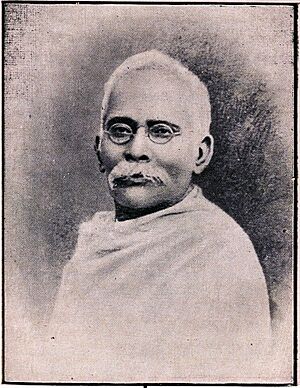Ashwini Kumar Dutta facts for kids
Quick facts for kids
Ashwini Kumar Dutta
|
|
|---|---|

Ashwini Kumar Dutta
|
|
| Born | 25 January 1856 Batajor, Bengal Presidency, British India
|
| Died | 7 November 1923 (aged 67) |
| Nationality | Indian |
| Occupation | Educationist, philanthropist |
| Parent(s) | Brajamohan Dutta |
Ashwini Kumar Dutta (born January 25, 1856 – died November 7, 1923) was an important person from India. He was a great teacher, someone who loved to help people (a philanthropist), a social reformer who worked to make society better, and an activist who fought for India's freedom.
Contents
Early Life of Ashwini Kumar Dutta
Ashwini Kumar Dutta was born on January 25, 1856. His family lived in a village called Batajor in Barisal district. This area was then part of Bengal Presidency in British India. Today, it is in Bangladesh.
His father, Brajamohan Dutta, was a judge. Ashwini Kumar Dutta studied hard from a young age. He passed his first big exam in 1870 in Rangpur. Later, he studied at Hindu College. He also studied law in Allahabad. After that, he returned to Bengal. He earned his Master's degree and a law degree from Krishnagar Government College.
Ashwini Kumar Dutta's Career and Contributions
Ashwini Kumar Dutta started his career as a teacher in 1878. He taught at Krishnagar Collegiate School. The next year, he became the headmaster of Chatra Nandalal Institution for seven months. In 1880, he became a lawyer in Barisal. He earned a lot of money as a lawyer. But he used most of his earnings to help others.
Founding Schools and Colleges
In 1884, he started the Brojomohun School. He named it after his father. This school opened on June 27, 1884. In 1889, he also started the Brojomohun College. He taught English at the college for 25 years without taking any pay. He truly believed in the power of education.
Working for Social Change
Ashwini Kumar Dutta was also very active in politics and social work.
- In 1886, he attended a big meeting of the Indian National Congress in Kolkata.
- He helped create the District Board in Barisal in 1887. This board helped manage local affairs.
- That same year, he started a group called Bakarganj Hitaishini Sabha. He also opened a school for girls.
- In 1887, he spoke at another Indian National Congress meeting. He asked for changes to make laws better.
- He became the Vice-Chairman of Barisal Municipality in 1888. Later, in 1897, he became its Chairman.
- In 1898, he helped write the rules for the Indian National Congress.
Role in the Swadeshi Movement
The Partition of Bengal in 1905 made him join the Swadeshi movement. This movement encouraged people to use Indian-made goods. It also asked them to avoid foreign products. He started the Swadesh Bandhab Samiti to help this cause.
In 1908, the government banned his group, the Swadesh Bandhab Samiti. He was sent away to jail in Lucknow. After his release in 1910, he focused on his schools. He had to accept government help to keep them running. In 1912, he handed over the management of the school and college to different groups.
Later Years and Activism
Ashwini Kumar Dutta continued to work for India's freedom.
- In 1918, he attended another Indian National Congress meeting in Bombay.
- After a big storm hit Barisal in 1919, he helped with relief work.
- In 1921, he supported the Non-Cooperation Movement. This movement used peaceful protests against British rule.
- Mohandas Gandhi visited Barisal that year to show respect for him.
- In 1922, he supported railway workers who were on strike. They were protesting unfair treatment.
Works by Ashwini Kumar Dutta
Ashwini Kumar Dutta wrote several books in Bengali. These books were about religion, philosophy, and love for his country.
- Bhaktiyoga
- Karmayoga
- Prem
- Durgotsavtattva
- Atmapratistha
- Bharatgeeti
 | Misty Copeland |
 | Raven Wilkinson |
 | Debra Austin |
 | Aesha Ash |

